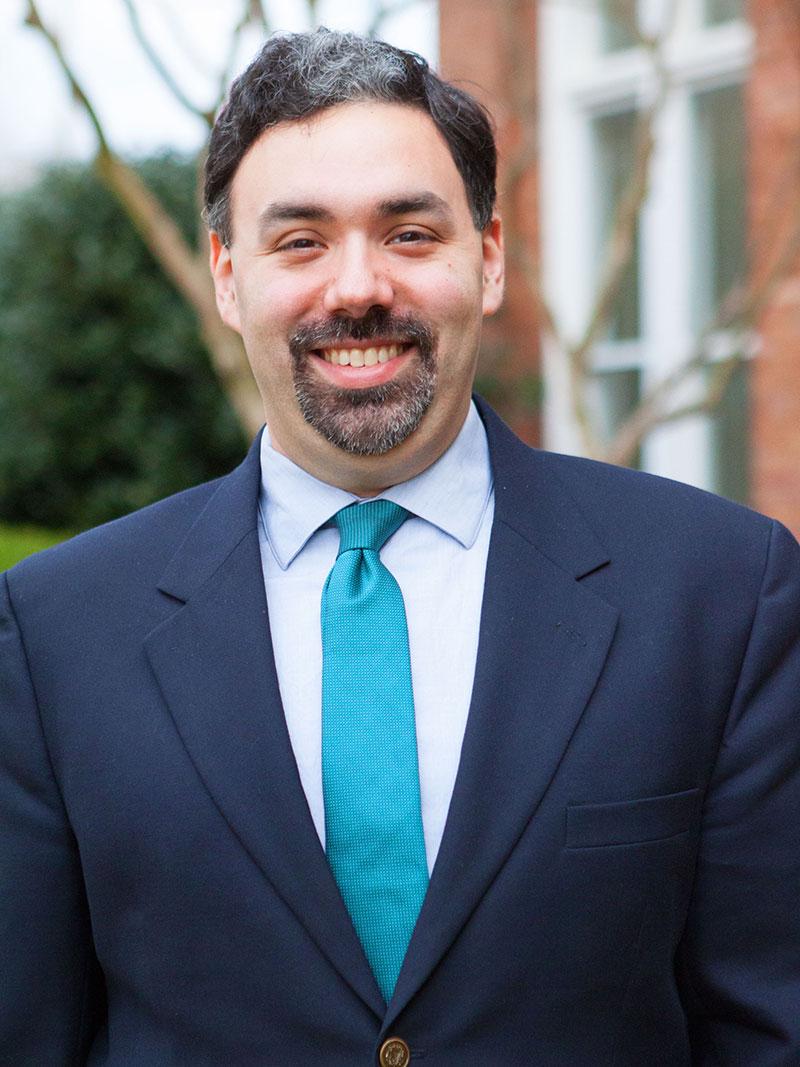Dr. Scott DiGiulio
Division
- Classics
Title
- Associate Professor
- Classics Section Head
Contact
Address
- 1300 Lee Hall
- Spring 2024 Office Hours: Tuesday 3:00pm-4:00pm; Wednesday 10:30am-11:30am; and by appointment
Joined CMLL in: 2016
Scott studies the intersection of Roman literature, scholarship, and readers; his primary research focuses on Latin prose literature, especially antiquarian miscellanies and their reception of earlier Greek and Roman historical, literary, and philosophical material. He also explores how ancient writers selected and preserved material from other authors, and how this process informed both ancient reading practice and processes of canon formation. His first book, Reading Miscellany in the Roman Empire: Aulus Gellius and the Imperial Prose Collection (Oxford University Press 2024; http://doi.org/10.1093/oso/9780197688267.001.0001), examines the compositional techniques and authorial strategies of Gellius’ miscellany in its Roman and Second Sophistic contexts. Scott’s broader research interests include Second Sophistic literary and intellectual culture, prose of the Roman Empire (especially collected literature), and the intersection of epigraphy and literary texts.
He is currently working on two further monograph projects. The first, Verba aliena: Quotation as Discursive Practice in Roman Literature, reevaluates the use of quotation as intertextual practice and suggests that processing tensions between quotation and new context represents an essential feature of reading ancient literature. The second, The Prosaics of Suetonius’ Lives, explores Suetonius’ corpus to identify the characteristic features of his prose style. The compiled nature of his work encourages different ways of reading that operate in mutually enriching fashion, with the interplay of these different ways of reading defining Suetonius’ prosaics.
Scott is also actively involved in a number of digital humanities projects; since 2014, he has served as the project manager for the U.S. Epigraphy Project, and was a member of the research team for the recently concluded international project "Visible Words: Research and Training in Digital Contextual Epigraphy." He has also served as an inscriptional encoding advisor for the International (Digital) Dura-Europos Archive since 2022.
RESEARCH INTERESTS
- Roman imperial literature
- Intellectual culture of the High Roman Empire
- Miscellanistic literature
- Ancient reading practice
- Digital epigraphy
TEACHING INTERESTS
- Latin literature
- Greek literature
- Roman history
- Ancient drama
- Ancient mythology
OTHER AFFILIATIONS
Senior Research Associate, Cobb Institute of Archaeology
OTHER
Inscriptional Encoding Advisor, International (Digital) Dura-Europos Archive
Project Manager, U.S. Epigraphy Project
Faculty Adviser, Classics Club at Mississippi State University
Faculty Adviser, Mississippi State Chapter of Eta Sigma Phi
NOTABLE AWARDS
- Basel Fellowship in Latin Literature, Universität Basel, 2025
- College of Arts and Sciences Research Award (Humanities), Mississippi State University, 2024
- Donald Zacharias Early Career Undergraduate Teaching Excellence Award, Mississippi State University, 2022
- Loeb Classical Library Fellowship, 2021
- College of Arts and Sciences Teaching Award (Humanities), Mississippi State University, 2021
- Schillig Special Teaching Projects Grant, Center for Teaching and Learning, Mississippi State University, 2021
- Research Scholarship for Young Researchers, Fondation Hardt, 2017
- France-Stanford Center for Interdisciplinary Studies Conference Grant, with I. Kuin (University of Groningen), and J. Arthur-Montagne (High Point University), 2015
- Fellow, Venice International University Advanced Seminar in the Humanities, 2013-2014
Monographs
Reading Miscellany in the Roman Empire: Aulus Gellius and the Imperial Prose Collection (Oxford University Press 2024). (http://doi.org/10.1093/oso/9780197688267.001.0001)
Edited Books
DocuMentality: New Approaches to Documents in the Roman Empire. J. Arthur-Montagne, S. DiGiulio, and I. Kuin, eds., Trends in Classics Supplementary Volumes 132 (De Gruyter 2022). (http://doi.org/10.1515/9783110791914)
Articles and Chapters
“ποικίλα ποικίλως: Situating Aelian’s Miscellanistic Programs Between Greek and Roman Models of Variety in the Second Sophistic,” TAPA 153.1 (2023): 213-251. (https://doi.org/10.1353/apa.2023.a901021)
“Dead Letters, Documentality, and the Attic Nights of Aulus Gellius,” in DocuMentality (J. Arthur-Montagne, S. DiGiulio, and I. Kuin, eds.) (2022): 181-208. (https://doi.org/10.1515/9783110791914-008)
“The Compiler Compiled: Didymus in Imperial Scholarly and Miscellanistic Literature.” In T. R. P. Coward and E. E. Prodi, eds., Didymus and Greco-Roman Learning, BICS 63.2 (2020): 79-94. (http://doi.org/10.1093/bics/qbaa018)
“Reading and (Re)Writing the Auctores: Poliziano and the Ancient Roman Miscellany,” Journal of Latin Cosmopolitanism and European Literatures 4 (2020): 33-58. (http://doi.org/10.21825/jolcel.vi4.16470)
“Gellius’ Strategies of Reading (Gellius): Miscellany and the Active Reader in Noctes Atticae Book 2.” Classical Philology 115.2 (2020): 242-264. (http://doi.org/10.1086/708236)
“Monumenta rerum ac disciplinarum? Varro’s Reception in Gellius’ Noctes Atticae.” American Journal of Philology 139.2 (2018): 311-341. (https://doi.org/10.1353/ajp.2018.0015)
Ph.D. in Classics, Brown University (2015)
A.B. in Classics, Harvard University (2009)
